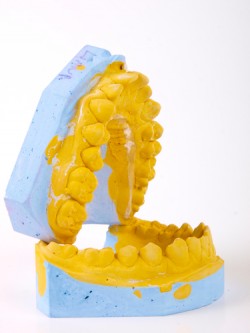Innocence Project sues museum for access to archives on ‘tragically flawed’ bite-mark evidence

The Innocence Project has sued the federal government’s National Museum of Health and Medicine for denying it access to archival information on the history of bite-mark analysis.
The Feb. 20 suit, filed in federal court in New York City, says access to information on the “tragically flawed forensic science” could help exonerate the wrongfully convicted. A press release on the lawsuit is here, and coverage by the New York Law Journal is here.
The material is in the archives of the American Board of Forensic Odontology, an organization that certifies dentists as forensic bite-mark experts. The organization has provided testimony and evidence leading to the conviction of defendants “in a plethora of criminal cases,” the suit says.
At least 30 known wrongful convictions and indictments stem from bite-mark evidence, the Innocence Project says.
A recent study “showed that forensic odontologists could not even reliably determine which injuries were bite marks, let alone match a mark to a unique individual’s teeth,” the suit says. “Untold numbers of people have been falsely convicted as a result of this faulty science.”
The museum is part of the U.S. Department of Defense. The suit claims that the museum violated the Innocence Project’s First Amendment rights by denying the information because of the group’s viewpoint and by retaliating because of its critical stance.
“The museum evidently sided with the ABFO—which has been hostile to the work of the Innocence Project and other critics—to prevent the Innocence Project from conducting research that could have produced unwelcome results and which could have further embarrassed the ABFO and its members,” the suit says.
The suit also alleges a violation of the Freedom of Information Act. The Innocence Project says it used FOIA to request the archival information and to seek correspondence between the museum and the odontology group. But the Innocence Project has received no meaningful response, the suit says.
Another cause of action alleges that the museum’s decision was arbitrary and capricious in violation of the Administrative Procedure Act.
See also:
ABA Journal: “Out of the blue”
ABA Journal: “Bite-mark evidence loses teeth”
ABAJournal.com: “Bite-mark expert’s flip-flop is cited in death-row inmate’s new appeal”
ABAJournal.com: “Judges frees man imprisoned for 28 years; discredited bite-mark evidence is cited”
ABAJournal.com: “Top state court vacates murder conviction, based on now-discredited bite-mark evidence and new law”
ABAJournal.com: “Bite-mark evidence should be allowed in murder case, says state judge”
ABAJournal.com: “Validity of forensic analysis routinely used in criminal trials is called into question”
Modern Law Library: “Dark tale of ‘The Cadaver King and the Country Dentist’ brings false convictions to light (podcast)”



